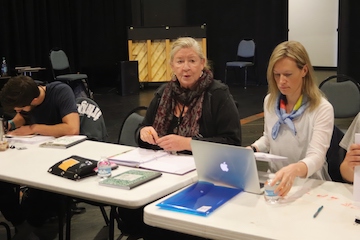Center Stage: Cathy Thomas-Grant to Direct Pepperdine Theatre’s The Tempest

Act I: Prologue
Twenty-seven years. Fifty-three different stage productions. Countless hours spent in rehearsals, production meetings, and one-on-one student mentoring sessions.

The numbers that describe Cathy Thomas-Grant’s tenure as a professor of theatre at Pepperdine University speak to both her creativity as a director and her dedication as an educator. While engrossed in every facet of a production, from choosing a work to stage to fine-tuning the delivery of a line, Thomas-Grant has cultivated a reputation for embracing theatre’s ability to comment on contemporary culture. In the process, she has taught her students about the power of art, the importance of engaging in difficult, messy conversations, and, of course, what it takes to produce quality drama.
“I just love theatre,” says Thomas-Grant.” I believe it is a powerful tool for social change, telling stories, and moving people either to tears or to laughter. Theatre is my vocation.”
Now, going on year 28 and show 54, Thomas-Grant is changing the lesson.
The Tempest, one of William Shakespeare’s later dramatic works, will premiere on April 3, 2024, at Pepperdine University. By choosing to take on the great bard and his rhythmic verse, Thomas-Grant is not concerned with creating social satire as the play lends itself to. Rather, this year’s student production resonates with the director because of its more timeless, personal themes—forgiveness and redemption.
Act II: Rising Action
While perusing potential options for this year’s theatrical season, Thomas-Grant considered works like The Trojan Women by Euripides and Ajax in Iraq by Ellen McLaughlin. Both of these shows center around war and its brutal, unforgiving promotion of chaos. Caught up in the darkness of global events, the news cycle, and the heavy thematic tones of these productions, Thomas-Grant decided to focus on a more uplifting narrative. Enter The Tempest—a comedy that takes place on a magical island.

“For me, The Tempest is an escape from all the suffering and unrest in our world right now,” says Thomas-Grant. “There is humor, there is love, there is forgiveness and redemption all packed in this play.”
Pepperdine is not alone in being drawn toward this lighthearted and comedic work. Four different productions of The Tempest are being performed in Los Angeles in 2024, pulling the 1611 play back into the limelight. With so many Tempests vying for the city’s attention, Pepperdine’s production highlights messages of vindication and redemption to distinguish it from the multitude of like productions.
While other theatre companies often focus on the classic play’s theme of colonialism, which offers opportunities for timely social commentary, Thomas-Grant has oriented Pepperdine’s student rendition around the more interpersonal topics that attracted her to the script in the first place. Pepperdine’s production also features the unconventional casting of women in roles originally written for men, refocusing the plot around the major dilemmas afflicting the story’s main characters and creating more obvious thematic turning points.
“Shakespeare is traditionally very male heavy,” says Thomas-Grant. “Expanding the gender pool adds texture and interest to the text. A mother-daughter relationship, for instance, is a lot different than a father-daughter one.”
By adding nuance to Shakespeare’s text, the director hopes Pepperdine’s story can more intentionally underscore the key messages of the show and provide a ray of light in the current cultural moment.
Act III: The Climax
“I have such a great creative team,” says Thomas-Grant. “It’s not about me, as the director, coming in and dictating. It is really a collaborative effort. I might come in with an idea, but the cast and crew have a way of opening your eyes to different possibilities.”

Once the race to opening night begins, Thomas-Grant carries the same schedule every day. She arrives on campus, in her office, by 8 AM. Grading, advising, teaching, and committee work take up the first part of the morning, followed by meetings with her creative team. Lunch, a nap, a PB&J, and she’s off analyzing the text that will be performed in rehearsal that night. From 6:30 to 10:15 PM the cast and crew meet to work on the production. And then, once she is back home at 11 PM, the day resets.
Again and again this backbreaking schedule will repeat itself until the conclusion of the production. However, while standing at the helm of a stage play on a night-in and night-out basis is exhausting, Thomas-Grant claims the endeavor is always worth it given the excitement of working with students.
“I just love working with my young artists,” she says. “I love creating with them. They make so many exciting, creative suggestions. They take my notes and my directions, consider them, and come back with something that is entirely their own. The characters they create are unlike any others because the students have such instinct as actors. ”
Moving at a self-assessed speed of 100 mph, rehearsals for The Tempest center around the iambic pentameter of Shakespeare’s language. Thomas-Grant is determined to help her students wrap their minds around the intent of the tongue-twisting rhythms that often accompany a Shakespearean play, helping them unlock new meanings beneath the surface. This process involves studying unfamiliar words, digging deep into character motivation, and finding the right mannerisms with which to project such nuances as an actor.
“The connection must be with the language,” says Thomas-Grant. “We must let the language work; we have to connect the audience and the characters on stage with it. That is the biggest challenge.”
Act IV: Falling Action
“Working with Cathy is like working with family,” says Kayla Bryant, a theatre major at Seaver College and one of the stars of The Tempest. “She really takes us under her wing and allows us to grow in our artistry. Cathy has shaped me, and my classmates, both in class and through her direction in shows, and I am just grateful for all that she’s taught me as a person, as a mentor, and, of course, as a director.”
Although the demands of directing a student production are extreme, Thomas-Grant finds value in the relationships forged throughout each successful show. The family-like atmosphere she builds with her cast emanates directly from her office, an old script closet, where she keeps a treasure trove of mementos from other successful campaigns.
Written prayers and song lyrics cover one wall, while different bits of student-made art cover another. One painting is from Academy Award–winning actor Anthony Hopkins, who personally delivered the piece. While chaotic, the pandemonium of her space feels intentional. Thomas-Grant admits she wants her office to be a place where students feel safe to come and talk.
“I try to leave my door open,” she says. “This is a good place to have a meeting with a student. Plain and simple, I want them to come in here and talk with me.”
Throughout the process of laboring over each creative decision, each unusual phrase of dialogue, and each setback or miscue, the director offers students guidance and comfort in the form of genuine connection. Ultimately, it is this position as a mentor that impacts students long after the final curtain.
Act V: Denouement

“Theatre is my life,” says Thomas-Grant. “I trained to be an actor and earned my MFA from the American Conservatory Theatre in San Francisco, but I somehow always had my hand in directing.”
Holding true to her vocation, Thomas-Grant will present her and Pepperdine’s latest theatrical production on April 3. The Tempest, with its integral themes and comedic nature, represents a shift in the director’s longtime dramatic approach while still holding true to inspiring social change. In promoting the values of forgiveness and redemption, Thomas-Grant is optimistic that her take on the Shakespearean classic will make people laugh and have hope for the humanity of this world.
“I chose The Tempest for the themes, the comedy, and the young love that’s present within the story,” she says. “That way, we can end the academic year in celebration.”